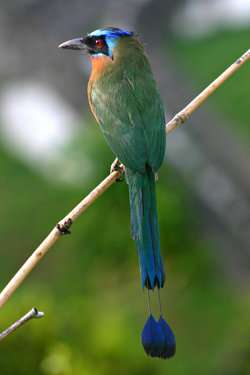Trinidad motmot
| Trinidad motmot | |
|---|---|
 | |
| in Tobago | |
| Scientific classification | |
| Kingdom: | Animalia |
| Phylum: | Chordata |
| Class: | Aves |
| Order: | Coraciiformes |
| Family: | Momotidae |
| Genus: | Momotus |
| Species: | M. bahamensis |
| Binomial name | |
| Momotus bahamensis Swainson, 1838) | |
The Trinidad motmot (Momotus bahamensis) is a colorful near-passerine bird endemic to the forests and woodlands of Trinidad and Tobago. This species and the blue-capped motmot, Lesson's motmot, whooping motmot, Amazonian motmot, and Andean motmot were all considered conspecific.
The central crown is black and surrounded by a blue band. There is a black eyemask. The call is a low owl-like ooo-doot.
These birds often sit still, and in their dense forest habitat can be difficult to see, despite their size. They eat small prey such as insects and lizards, and will also regularly take fruit.
Like most of the Coraciiformes, motmots nest in tunnels in banks, laying about three or four white eggs.
References
- ↑ BirdLife International (2016). "Momotus bahamensis". IUCN Red List of Threatened Species. Version 2016.1. International Union for Conservation of Nature. Retrieved 13 August 2016.
External links
This article is issued from Wikipedia - version of the 11/19/2016. The text is available under the Creative Commons Attribution/Share Alike but additional terms may apply for the media files.
